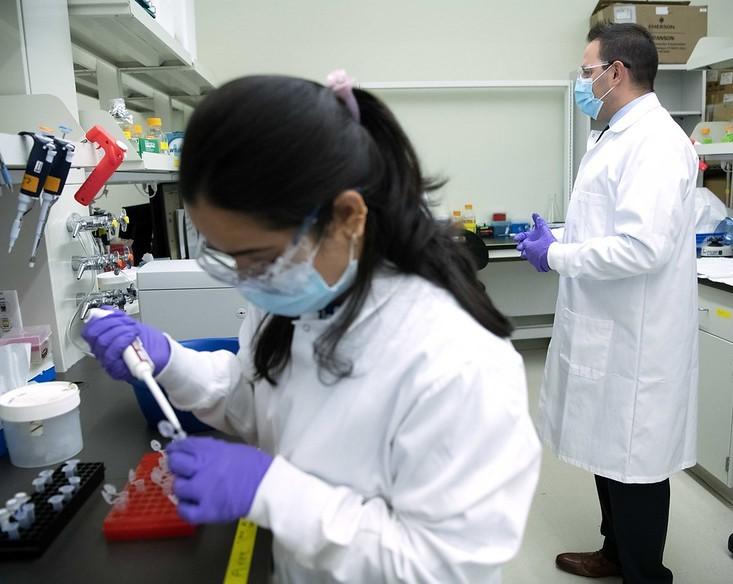COVID-19 survivors and those vaccinated against coronavirus appear able to fight off infection with the B117 SARS-CoV-2 variant but may not have the same level of protection against the B1351 variant, according to two new studies.
Importance of second vaccine dose
In the first study, published late last week in Nature Medicine, researchers at Institut Pasteur in Paris isolated infectious B117, the variant first identified in the United Kingdom, and B1351, first discovered in South Africa, from the nasal swabs of symptomatic COVID-19 patients. Like some other emerging variants, B117 and B1351 are more infectious than previously dominant varieties, leading to fears that they could evade natural and vaccine-induced immunity.
The researchers tested the variants' susceptibility to SARS-CoV-2 antibodies from serum samples from 58 patients infected with the previously circulating D614G reference strain (pseudovirus) and 19 people who had received two doses of the Pfizer/BioNTech mRNA COVID-19 vaccine within the previous 6 weeks.
Antibodies from patients who had recovered from the virus within the previous 9 months neutralized B117 as well as D614G. Samples collected after 9 months, however, showed a sixfold reduction in antibody concentrations, with 40% of the samples unable to neutralize B1351.
Similarly, antibodies from people fully vaccinated against COVID-19 were also able to defend against B117 but less so against B1351, compared with D614G. While antibody levels rose overall after the second shot, anti-B1351 antibodies remained 14 times lower than those against D614G. SARS-CoV-2 antibodies were rarely observed in nasal swabs obtained from vaccinees.
"Thus, faster-spreading SARS-CoV-2 variants acquired a partial resistance to neutralizing antibodies generated by natural infection or vaccination, which was most frequently detected in individuals with low antibody levels," the authors wrote. "Our results indicate that B1.351, but not B.1.1.7, may increase the risk of infection in immunized individuals."
The authors noted that previous studies have shown that the Moderna mRNA COVID-19 vaccine also staves off infection against virus variants but that its efficacy is 5 to 10 times lower against B1351, compared with D614G.
The researchers said that it's important to evaluate different strains' antibodies to virus variants using authentic clinical viral isolates, as they did, rather than with lab-engineered pseudoviruses, which most previous studies have used. They called for larger studies of vaccinees with and without previous COVID-19 infections and longer follow-up periods to better characterize the role of immune responses after vaccination.
"Our study also highlights the importance of the second dose of the Pfizer Cominarty [sic] vaccine, which was associated with a strong increase of neutralizing antibody titers and a widening of strain cross-reactive antibody responses," the authors wrote. "In conclusion, our results demonstrate that suboptimal or declining antibody responses are associated with a loss of cross-reactivity against novel emerging viral strains."
Antibody cross-reactivity
The second study, led by researchers at the University of KwaZulu-Natal in Durban, South Africa, and published today in Nature, used plasma from hospitalized adult COVID-19 patients to compare antibody responses to live B1351 virus and a reference SARS-CoV-2 strain from the first and second pandemic waves 1 month after symptom onset in July 2020 and January 2021, respectively. B1351 is now the dominant strain in South Africa.
None of the 14 first-wave plasma donors were infected with B1351, which had infected all six second-wave donors. Antibodies from first-wave plasma donors neutralized the SARS-CoV-2 reference strain but had poor efficacy against B1351, with a 15.1-fold fall in neutralization compared with antibodies from second-wave donors.
While antibodies from second-wave plasma donors effectively defended against both B1351 and the reference strain, they were 2.3-fold less effective against the reference strain than antibodies from first-wave donors. None of the second-wave donors had been infected with the reference strain during the first wave.
The authors said that understanding how antibodies against one strain may protect against another type could help inform vaccine development. "The observed effective neutralization of first wave virus by [B1351] infection elicited plasma provides preliminary evidence that vaccines based on [variants of concern] sequences could retain activity against other circulating SARS-CoV-2 lineages," they wrote.




















